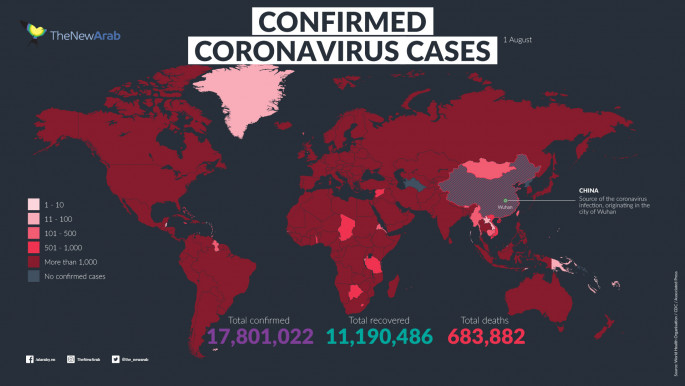The Middle East at war with coronavirus: Top stories from 15 April
1. Syrian regime urged to release doctors after coronavirus crisis breaks out
The Syrian regime is facing renewed calls to release detained healthcare workers amid a coronavirus pandemic which threatens to kill thousands.
Campaigners and families of detainees and forcibly disappeared medical workers on Wednesday urged the release of doctors and nurses in a statement prepared by The Syria Campaign, a UK-based rights organisation.
Among the thousands of people detained by the Syrian regime since the uprising began in 2011 are 3327 healthcare workers, the Syria Campaign said.
Damascus and its ally Moscow have also been accused of routinely and deliberately targeting healthcare facilities in rebel areas throughout the nine-year war.
Healthcare workers who treated anti-government protests from 2011 or who operated in opposition-held areas retaken by the regime have also been jailed.
2. Algeria's "Radio Corona Internationale" continues Hirak under coronavirus lockdown
Algerians have had to put their bi-weekly street protests on hold after the coronavirus pandemic swept across the country – but the Hirak is being kept alive another way: radio.
The online broadcaster is called Radio Corona Internationale and broadcasts Tuesdays and Fridays to coincide with the days the protest movement took to the streets.
|
"Dear coronists, we give you the floor to tell us about your confinement or ask us questions or criticise us," RCI's Facebook page reads.
The radio acts like a pirate radio station and has thousands of listeners from across Algeria.
3. Iranian government report suggests virus deaths 'nearly double' reported figures
The death toll in Iran from the coronavirus pandemic is likely to be nearly double the officially reported figures, due to undercounting and because not everyone with breathing problems has been tested for the virus, according to a parliament report released on Tuesday.
The number of people infected is probably "eight to 10 times" higher than the reported figures, the report said.
If correct, the report's worst-case figures would put Iran's death toll potential over 8,500, with some 760,000 total cases. That would catapult Iran to the country with the highest number of infections in the world.
4. Turkey child abuse reports rise as coronavirus lockdown keeps kids trapped indoorsReports of child abuse are on the rise in Turkey as the government enacted a nationwide shutdown of schools due to the coronavirus pandemic.
Around 20 million children are stuck at home in Turkey after schools shuttered their doors in mid-March, inadvertantly sparking an unprecedented rise in reports of abuse, as parents and care-givers observe signs of non-domestic abuse, Al-Monitor reported.
Read more: Turkey coronavirus daily death toll exceeds 100 for first time
A prominent advocate for child abuse victims brought the topic to attention earlier this month.
"Mothers are taking notice of their children at home. We are receiving too many child abuse complaints. My heart is broken, I feel sad, we will do everything we can to help them," Saadet Ozkan Efe wrote on Twitter.
Iran's Islamic Revolutionary Guards Corps (IRGC) unveiled a new technology on Wednesday claiming that it can detect people within a 100-metre radius carrying the coronavirus and diagnose within seconds.
The Iranian official agency, IRNA, quoted IRGC's commander saying that the "achievement" is "unique" and has been developed by IRGC's notorious paramilitary force, the Basij.
IRGC Major-General Hossein Salami claimed that the Iranian creation could detect the virus on contaminated surfaces - as well as in people - through a "magnetic field", according to the news agency.
Critics have been quick to jump on the group's claims of its "revolutionary" discovery, calling it nothing more than a "farce".
 |
![Coronavirus daily ] Coronavirus daily ]](/sites/default/files/styles/large_16_9/public/media/images/A691077A-4EDC-4D55-906E-50A8A4F02BCA.jpg?h=d1cb525d&itok=NOf_Vt7M)


